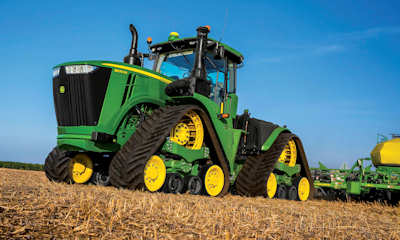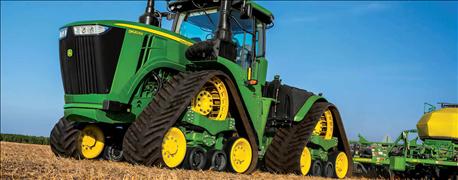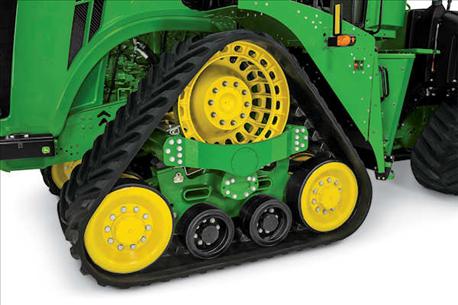August 25, 2015

The sneak peek came a year ago at the John Deere rollout of the new 9R/9RT lineup - a four-track machine dubbed the 9RX. At the time, many assumed the X stood for experimental, yet as farmers hit the John Deere exhibit at the fall farm shows they'll see there is nothing experimental about this new four-track machine.

BOLD MOVE. John Deere enters the four-track design market segment with the 9RX lineup. The four-machine line includes sizes from 470 to 620 engine hp. (Photo: John Deere)
The 9RX line includes four models - the 9470RX, 9520RX, 9570RX and 9620RX with the model number denoting engine horsepower. There are three scraper special models - the 9470RX, 9520RX and 9570RX too. "We've leveraged our learning from the past 20 years with our two-track systems," says Jerry Griffith, division marketing manager manager, high-horsepower tractors. "We took what we learned about the way we tension our belt systems, our alignment and our mid-roller technologies with our 8RT and 9RT and developed our four-track tractor."
The key, Griffith says, is an undercarriage design that is "very robust and delivers maximum uptime and a low cost of operation."
It's difficult not to compare what John Deere has done versus competitive machines and Griffith addresses that discussion. He notes that buyers will see a taller undercarriage compared to competitors with a larger drive sprocket - 39.5-inches in diameter - and more wrap angle for more positive drive lug engagement. "The belt is 20% longer and the advantage of that is that to travel the same distance as a competitor our belt will travel 20% less," Griffith says. "That will equate to 20% longer wear life of our belt."
More about the drive

TALLER STANCE: The undercarriage of the 9RX is taller with a longer track, which the company says will add to belt life. And maintenance points are designed to be simpler too.
In the four-track system the belt has drive lugs - it is a positive-drive system - versus the two-track system that uses guide lugs and a friction drive design. Griffith notes that the tension on the belts is significantly higher than the competition, which he says is a contributor to maintaining contact with the ground. Mid rollers on the 9RX are the same as those on the 8RT line, which is designed to offer easy change out if it does need replacing. "[After you de-tension the belt] you just loosen some hardware and pull out the bad mid-roller and put in a new mid-roller," he notes.
The design uses a sealed mid-roller with a rubber or poly coating for the wear surface.
The John Deere system uses wider drive lugs than competitive models and there are more drive lugs engaged in the drive sprocket, which boosts the surface area engaged per lug, which decreases the chances of skipping a drive lug on the belt. These will be fixed-width machines with two belt widths - 30-inches and 36-inches. Scraper models will only offer the 30-inch belt. "We do have a narrow track machine in development that would be row crop compatible," Griffith points out.
~~~PAGE_BREAK_HERE~~~
The tracks offered on these machines are Camoplast Duradrive 3500 Series and Camoplast Duradrive 6500 Series with Durabuilt technology tracks. The 3500 and 6500 tracks are the positive drive versions of the Durabuilt 4500 and 6500 series tracks used on the friction drive undercarriage of the 9RT lineup.
Engine power and more
There are two engine choices for the line up with the 9470RX and 9520RX powered by a John Deere PowerTech PSS 13.5-liter engine. The larger two machines - the 9570RX and 9620RX - have Cummins QSX15 engines.
The company went to the larger Cummins engines with the announcement of the new 9RT lineup last year. It's not the first time Deere has selected a Cummins power plant for big tractors, but last year the rules changed. The last time the John Deere chose the Cummins engines for their four-wheel drive tractors, local John Deere dealers couldn't work on those machines.
That's the past - all John Deere dealers are certified to work on the QSX engines in those bigger tractors. "We've had positive comments from the field about how those engines are performing," Griffith says. "They have the pulling ability and they like the power being provided. Any minor issues they come across can be dealt with at the dealership. We are meeting the objectives we had with this [engine choice]."
There's an enhanced CommandView III Cab with the 9 Family tractors. The enhancement is a suspended cab. It's the first suspended cab for the Series 9 Tractors. Griffith explains that with the four axle design the best way to get the ride quality was through a cab suspension system. The cab has spring-loaded shocks on each corner and a Parallel Plane Four Bar Linkage to control cab movement and isolate the cab and operator from impacts and vibration.
Griffith adds that the new tractor will have a lot of the same benefits as its siblings, the 9R and 9RT including the e18 Powershift Transmission with Efficiency Manager for improved fuel management. That system provides automated engine and transmission control to deliver fuel savings. The CommandView III Cab operating environment includes the Generation 4 CommandCenter display that's easy to navigate and customize. There's also the option of adding Active Command Steering which in these drive-by-wire machines manages the steering through software to make steering control easier and more precise.
The redesigned hydraulic system available on the 9R/9RT Series is offered on the 9RX too. This system delivers industry leading high-flow hydraulics option providing 115 gallons per minute of flow and up to 8 rear SCVs for implements with high hydraulic demands.
Griffith notes that this tractor is also John Deere FarmSight ready to work with all the components and technology designed for the MyJohnDeere system that allows farmers to collect and share information about any task being accomplished on the farm. "We have the Green on Green integrated technologies like John Deere Ag Management Systems precision farming equipment. Our integration with our new technologies on our tillage system, for example, allows you to set depth control from the cab," Griffith says.
About the Author(s)
You May Also Like






